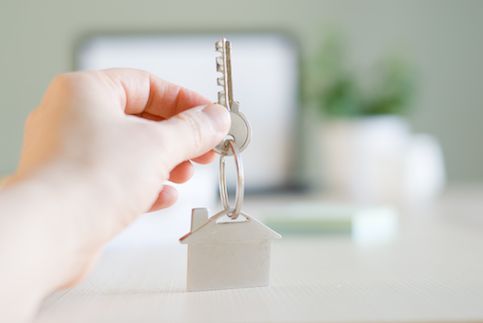Sometimes, the path to homeownership is straight and smooth. And other times, it twists and gets bumpy. No two home buying experiences are the same – and neither are their timelines.
The unpredictability of the process can be a major stressor for first-time home buyers because buying a house is more than a financial transaction. It’s a deeply personal process of finding and creating a home for yourself and your family, so it makes sense to want to understand the process before diving in.
So, how long does it take to buy a house? The average home buying timeline is around 50 days, but different factors can alter this estimate. Let’s look at a step-by-step breakdown of the process so you can prepare for your unique home buying journey.
A Step-By-Step Timeline For Buying A Home
The exact amount of time the home buying process will take depends on several factors – from how prepared the buyer is to how competitive the market is.
Let’s look at the crucial steps that will impact the time it takes to purchase a home.
Step 1: Choose A Mortgage Lender And Get Preapproved (1 – 5 Days)
Unless you’re making a cash offer, you’ll probably need a mortgage to finance your home purchase. Before you start looking for a house, shop around for the right mortgage lender to make sure you’re getting the best deal on your home loan.
Consider interest rates and estimated closing costs when choosing a lender – but don’t underestimate the value of checking their reputation. A great deal on paper may not be worthwhile in the long run if it means dealing with unreliable customer service.
Once you have a trustworthy lender to work with, consider getting a mortgage preapproval. Getting preapproved before beginning your home search is beneficial for several reasons. First and foremost, the preapproval letter will let you know how much home you can afford. And it’ll show sellers that you’re a serious buyer.
Depending on the lender, preapproval can take 1 – 5 days.
Step 2: Find A Real Estate Agent (1 – 7 Days)
From online listings to referrals from friends and family, there are multiple ways to find a real estate agent. The goal is to work with a licensed expert who understands the market you’re interested in. Make sure you find someone you trust to prioritize your home buying needs.
The time it takes to find an agent will depend on several factors. If the agent was recommended to you by a friend, you may not feel the need to interview them or compare them to other agents. But if you want each decision you make to be informed by your research, you’ll likely take whatever time you need to find an agent you’re comfortable working with.
Step 3: Start House Hunting (6 Months – 1 Year)
Before you start house hunting, consider details like your desired location and the number of bedrooms and bathrooms you need and then set parameters for your search. Finding the right property takes up the most time in the home buying process, so clearly defining your needs and knowing what to look for in a house ahead of time can help expedite your timeline.
How long it’ll take to find your new home will depend on several factors, including:
- The market: In a seller’s market, there is more demand than supply, so it may take longer to find a home. You may have an easier time finding a home in a buyer’s market because there are more homes for sale than buyers.
- The location: If you’re looking for a home in a highly sought-after location, buyer competition may delay the process. And if the average sales price is more than you can afford, you may need to pause your home buying plans until you find a home for sale within your price range.
- Your criteria: If you have a long list of new home must-haves, it may take more time to find a house. The more specific and inflexible you are, the more you’ll limit your search. On the other hand, if you start looking for homes and have no idea what you want, you may find it harder to commit to a property.
- Your schedule: If you’re really busy and can only go to showings on the weekends, it may take longer to find a home.
Step 4: Make An Offer (1 – 3 Days)
Once you find a house you want to buy, work with your real estate agent to make an offer on the home. Your agent will run a comparative market analysis at this stage to determine a fair purchase price. They’ll also help you with anything else you want to include in the offer, such as contingencies or an earnest money deposit.
In some states, the seller may have a deadline to reply to your offer. But in general, sellers typically respond to offers within 3 days. The seller can accept or reject the offer or make a counteroffer, which would restart negotiations. Negotiations typically don’t last more than a few days. And remember, the seller is usually just as eager to sell their home as you are to buy it.
Step 5: Secure Your Mortgage Loan (30 – 60 Days)
Despite your initial approval, or preapproval, it’ll take some time for your mortgage lender to underwrite your loan. Mortgage underwriting is the process of analyzing and verifying your financial information, including your bank statements, pay stubs and other documents, and information about the property you’re buying. The underwriting step typically happens while other steps are in motion, including the home inspection, appraisal and closing preparation.
The underwriting process can take a few days or a few weeks, and you can have a big influence on just how long it takes. To speed up the process and avoid any snags along the way, we recommend preparing your documents in advance, responding to all lender questions and requests quickly and holding off on acquiring new debt throughout the process.
Step 6: Get A Home Appraisal (2 – 7 Days)
Once the purchase agreement is signed, your mortgage lender will order a home appraisal. This is an important step in the process. The appraisal is used to determine the property’s fair market value. Your lender can only lend you money up to the fair market value of the home. If the home appraises for less, you’ll either pay the difference out of pocket or renegotiate a lower price with the seller. Either of these scenarios can extend your timeline.
The home appraisal typically occurs while your lender is underwriting your loan. Depending on the property’s size, the appraisal can take 20 minutes to a few hours to complete.
After the home visit, a third-party appraiser will compare the home to similar, recently sold homes in the area and create a report. Depending on the appraiser, generating a report can take anywhere from a day to a few days. How long it takes to complete the appraisal will depend on when the lender orders the appraisal and the appraiser’s availability.
Step 7: Schedule A Home Inspection (3 – 10 Days)
While an appraisal gives you an estimate of the home’s value, the home inspection is an in-depth visual examination of the property to uncover any issues that may need fixing. Inspections can uncover red flags.
Home inspections usually occur within a few days of contacting an inspector and take a few hours to perform. From there, the inspector will produce a report, which can take up to a few days to create, depending on the property.
You may need to negotiate with the seller if the inspector discovers any issues. If there are significant problems, you can request that the seller fix them before you close or lower the purchase price to help pay the cost of repairs. These negotiations can potentially lengthen your purchase timeline.
Step 8: Do A Final Walkthrough (1 Day)
The final walkthrough is the last opportunity for buyers to inspect a house before closing. It is a crucial last step in the home buying process. You’ll want to ensure that everything in the home is in the same or better condition.
If you requested repairs as a condition of the sale, make sure the seller completed the repairs before you sign your closing documents.
Step 9: Close On Your Home (7 – 14 Days)
During the closing process, a title company will complete a title search and property survey to ensure the property has no other claims. You’ll purchase homeowners insurance, and your lender will draft a Closing Disclosure.
The Closing Disclosure outlines the final terms of your loan, including your APR and closing costs, including any escrow fees, title fees, property taxes and lender fees for processing the loan.
By law, your lender must give you at least 3 business days to read through your Closing Disclosure, after which they’ll schedule your closing date. During closing, you’ll sign your mortgage agreement, pay your down payment and closing costs and get the keys to your new home.
Congratulations! You’re officially a homeowner.
See What You Qualify For
Buy A Home
Discover mortgage options that fit your unique financial needs.

Refinance
Refinance your mortgage to have more money for what matters.
Tap Into Equity
Use your home’s equity and unlock cash to achieve your goals.
What To Consider Before Buying A Home
Understanding the steps involved in buying a house can help you move quickly when the time finally comes. Before you take the next steps toward buying a house, make sure you’re financially prepared. Being financially prepared means saving for a down payment and closing costs and ensuring you can secure the financing you need.
Your credit and financial history will determine whether you qualify for a mortgage and at what interest rate, so review your credit information and build your credit score if necessary. It’s also important to consider the parts of your home search that aren’t related to money, such as areas you’d like to live in and the type of home most suitable for your lifestyle.
Find A Mortgage Today and Lock In Your Rate!
Get matched with a lender that will work for your financial situation.
FAQs About How Long It Takes To Buy A House
Let’s explore some common questions about how long it takes to buy a house.
Is 60 days enough time to buy a house?
How long it takes to buy a house will depend on variables like the type of mortgage you use, the current housing market and more. But the average time for real estate transactions with a mortgage is 60 days or less. If you run into an unforeseen issue like a low home appraisal, home inspection concerns or underwriting delays, it could take longer.
What’s the average amount of time it takes to buy a house using a mortgage?
According to ICE Mortgage Technology™, a data firm that processes mortgage applications, in June 2021, the average time to close on a mortgage was 51 days.
How long does it take the average person to buy a house?
While you may be able to close on a home in 30 – 45 days, the time it takes to find a home you want to purchase and get your offer accepted can vary based on the local market, your goals and your financial situation.
The Bottom Line
Buying a house can be a lengthy process, but knowing the steps to buying a home in advance may help speed up your home buying timeline.
Take the first step to buy a home.
Quicken Loans® lets you get to house hunting sooner.

Katie Ziraldo
Katie Ziraldo is a financial writer and data journalist focused on creating accurate, accessible and educational content for future generations of home buyers. Her portfolio of work includes The Detroit Free Press and The Huffington Post.












